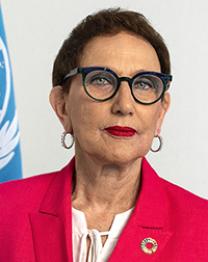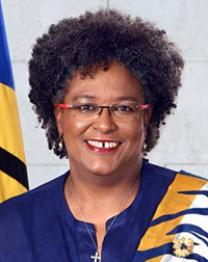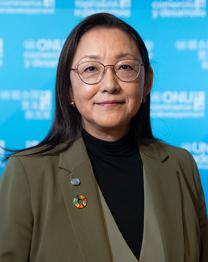
Watch opening address by Mia Amor Mottley
This opening session sets the stage for the UNCTAD15 Creative Industries and Trade Digitalization Forum tackling the big questions facing the creative sector as digital transformation continues to shape its future.
Creative industries through the lens of digitization: Trends and policy challenges
International trends, technological advances and global processes play a key role in shaping the creative economy. UNCTAD's Creative Economy Outlook 2018,2 identified, for example, digital disruption as a key trend that is shaping creative industries, especially in developing countries.
Digitalization offers both opportunities and new challenges for the creative sector (Digital Economy Report, 2019). On the one hand, the internet has made it possible to distribute creative work online. On the other hand, digital platforms rarely generate substantial remuneration for content creators and capture a significant share of revenue generated. A global digital divide furthermore persists with repercussions on the creative economy’s ability to be truly inclusive. Moreover, the gains in social linkages and cohesion created by face-to-face cultural experiences or the act of creation itself, might be lost with digitalization.
To advance support and understanding of the creative economy as a route for economic diversification and inclusive development, these global developments require careful examination. They raise issues related to the historical imbalances and asymmetries in the global creative and tech economies and their current impacts, rebuilding of the creative sector after COVID-19, the future of work, e-commerce platforms as well as terms of trade, gaining access to global distribution networks, building digital skills and capacity, among others. This webinar will explore these mega-trends that are shifting and redefining the creative industries eco-system.
Questions for discussion
- Some of the questions tackled include: how have the global creative and tech economies been formed and how are they transforming?
- What current opportunities and challenges are presented by these transformations?
- What are the problems generated in particular by digitalization?
- What can policies do to promote sustainable outcomes of digital transformations?
Programme
Introduction
- Ms. Marisa Henderson, Chief, Trade and Creative Economy, UNCTAD
High level Opening remarks:
- Ms. Rebeca Grynspan, Secretary-General, UNCTAD
- The Hon. Mia Amor Mottley, QC, MP, Prime Minister of Barbados
- H.E Mr. Sandiaga Uno, Minister of Tourism and Creative Economy, Indonesia
Moderator:
- Ms. Josanne Leonard, Grammy Award nominated Broadcaster, Trinidad and Tobago.
Panellists:
- Mr. Nicholas Brancker, Musician.
- Mr.John Howkins, Author and Expert on Creative Industries
- Mr. Jean-Philippe Audoli, President of Waw Muzik, Music platform specialized in African music
- Ms. Birame Sock, Founder of Kweli and member of the eTrade for Women Community of West Africa
Closing Remarks:
- Ms Miho Shirotori - Head, Trade Negotiations and Commercial Diplomacy Branch, UNCTAD
Performance:
- Spoken word by Mr. Adrian Green
In September 2021, Rebeca Grynspan was appointed Secretary-General of the United Nations Conference on Trade and Development (UNCTAD), becoming the first woman to lead the organization in its 60-year history.
Rebeca Grynspan, an economist and former Vice President of Costa Rica, is an experienced leader of international institutions with a substantive track record in government, UN diplomacy, economic policy and multilateral cooperation at the global level.
Prior to joining the United Nations, she was Vice President of Costa Rica and held cabinet positions as Minister of Housing, Minister Coordinator of Economic and Social Affairs and Deputy Finance Minister.
Previously, she served as Secretary-General of the Ibero-American Conference (2014–2021), chairing regional summits of Heads of State and Government; United Nations Under-Secretary-General and Associate Administrator of the United Nations Development Programme (UNDP); and UNDP Regional Director for Latin America and the Caribbean. She was a member of the UN Commission for the Reconstruction of Haiti, representing the UN Secretary-General.
At UNCTAD, Grynspan has been at the centre of critical negotiations to address global trade and development challenges. She played a decisive role in the successful Black Sea Grain Initiative brokered between the UN, Türkiye, the Russian Federation and Ukraine, which enabled the safe export of over 32 million tons of grain, lowered global food prices by 22% and prevented millions from falling into food insecurity. She also leads the UN Global Crisis Response Group on food, energy and finance, and has represented the UN in G20 summits.
Her leadership has been recognized widely. In 2024, she received the Doha Negotiator of the Year Award for spearheading UN efforts to restore Black Sea trade routes. In 2025, Spain’s Ministry of Foreign Affairs, European Union and Cooperation awarded her the inaugural Isabel Oyarzábal Women in Multilateralism International Prize for her contribution to multilateralism.
Ms. Grynspan holds degrees in economics from the University of Costa Rica and the University of Sussex, and honorary doctorates from several European universities.
The Honourable Mia Amor Mottley, Q.C., M.P., became Barbados' eighth and first female Prime Minister on 25 May 2018.
Ms. Mottley was elected to the Parliament of Barbados in September 1994 as part of the new Barbados Labour Party Government.
Prior to that, she served as one of two Opposition Senators between 1991 and 1994. One of the youngest persons ever to be assigned a ministerial portfolio, Ms. Mottley was appointed Minister of Education, Youth Affairs and Culture from 1994 to 2001.
She later served as Attorney General and Deputy Prime Minister of Barbados from 2001 to 2008 and was the first female to hold that position.
Ms. Mottley is an Attorney-at-law with a degree from the London School of Economics, specialising in advocacy. She is also a Barrister of the Bar of England and Wales.
In 2002, she became a member of the Local Privy Council. She was also admitted to the Inner Bar, becoming the youngest ever Queens Counsel in Barbados.
Miho Shirotori is the Head of the Trading Systems, Services and Creative Economy Branch in UNCTAD's Division on International Trade and Commodities.
She leads a team of experts assessing pathways to improve the developmental impact of trade by negotiating and implementing trade agreements, strengthening policy-making capacity in services trade, and promoting the creative economy to achieve more inclusive economic diversification.
Miho's own expertise includes the development impacts assessment of preferential market access for developing countries, most notably the Generalized System of Preferences (GSP).
Miho has been contributing her technical and institutional knowledge to support UN Member States in shaping decisions to promote more equitable trade across multilateral, North-South, and South-South trade frameworks.
Miho demonstrates a strong track record of leadership and team management within the international organizational context.
She holds master's degrees in economics (London School of Economics and Political Science, international economics (Graduate Institute of International and Development Studies, Geneva), and public administration (Harvard Kennedy School).
John Howkins is founder and chair of InWork, a director of First Person Films and Television Investments, and former chairman of BOP, Tornado Productionsand CREATEC as wll as the London Film School.
John is a a global strategist on creativity, innovation and work. His books include ‘The Creative Economy’ (2001), ‘Creative Ecologies’(2006) and ‘Invisible Work’ (2020).
He worked with HBO and Warner Bros as Chief European Adviser for 20 years, as well as with many other companies. He is a former adviser to the United Nations, UNCTAD, WTO, ITU, WIPO, World Bank, European Union and Asean. He is a member of the United Nations’ Committee on the Creative Economy.
John is a founding investor in the Shanghai Creative Industries Investment Corporation and chairman of CrecoLab in Beijing.
He is the Founder of the Adelphi Charter on Creativity, Innovation andIntellectual Property, and devised the IP advisory service Own It. He is a visiting professor at several universities and a former Executive-in-Residence at the Drucker School of Management, Los Angeles.






